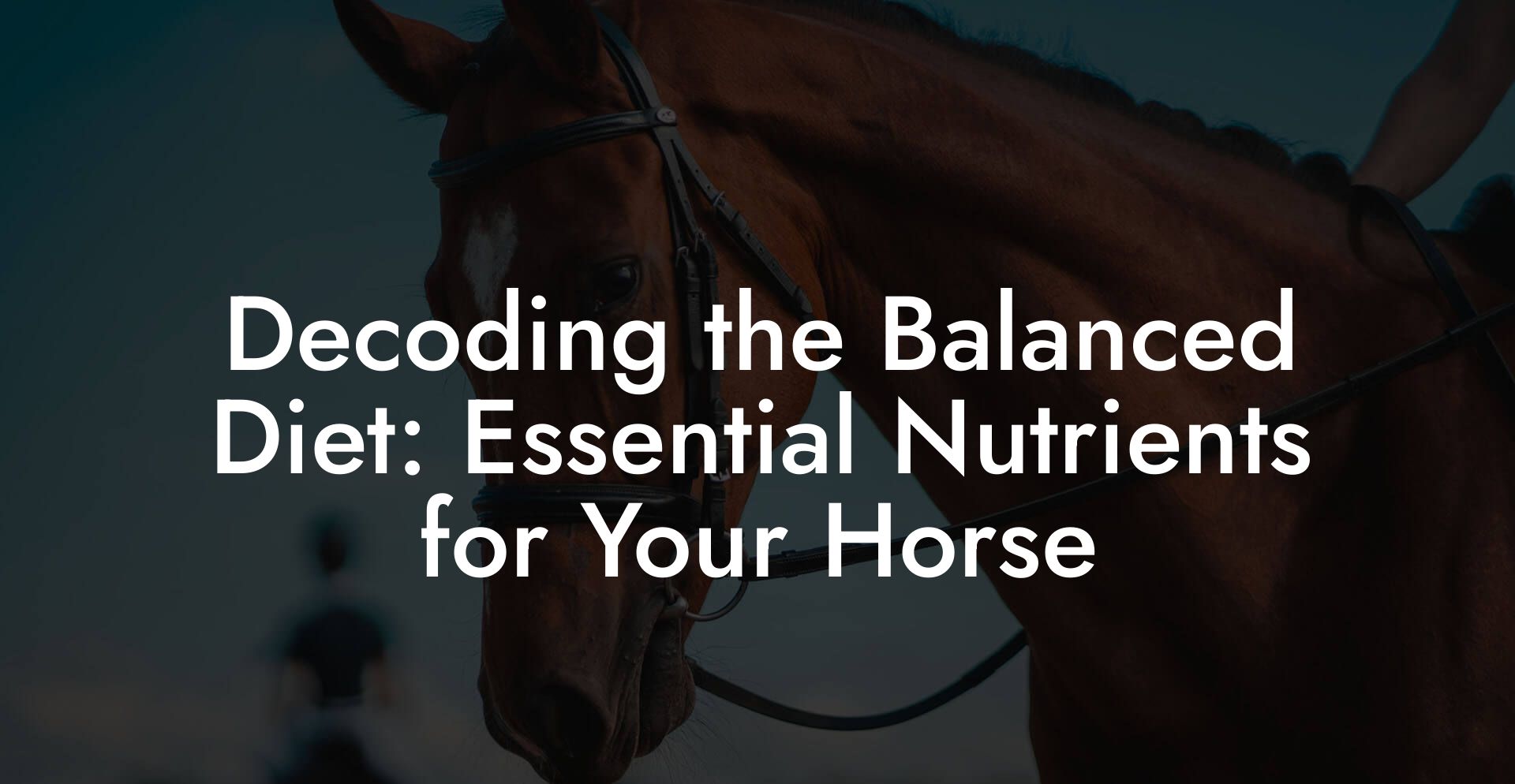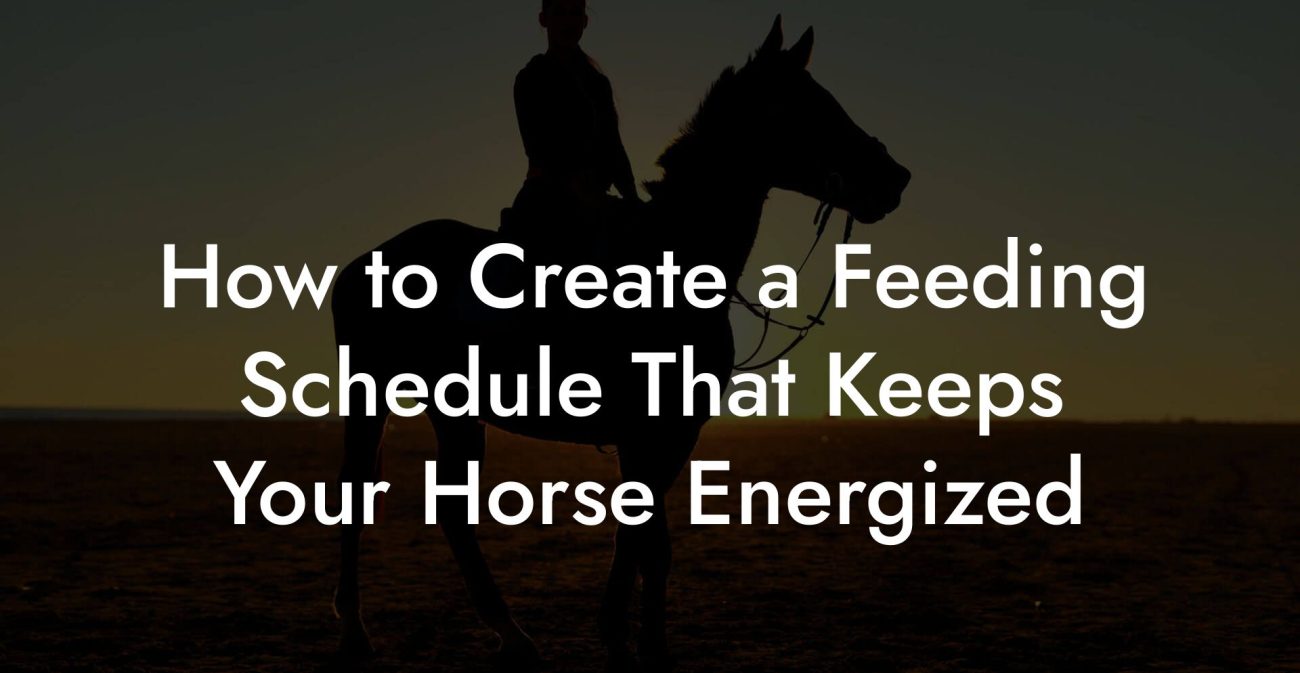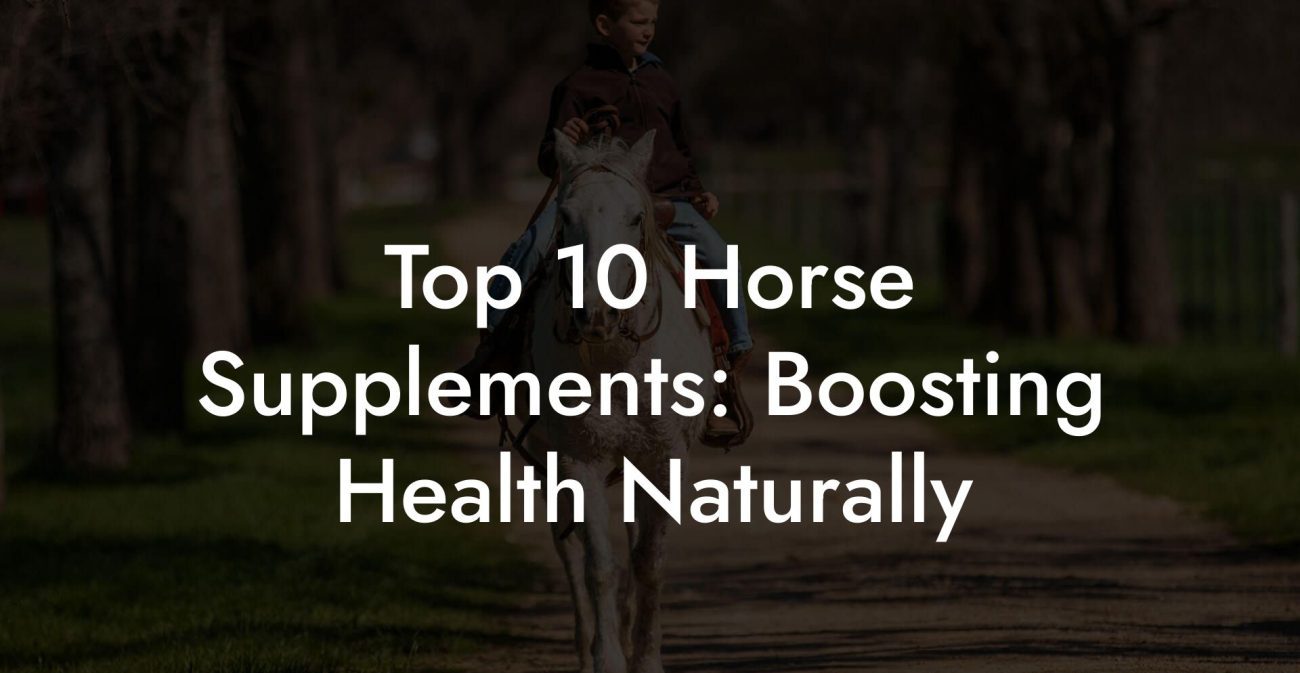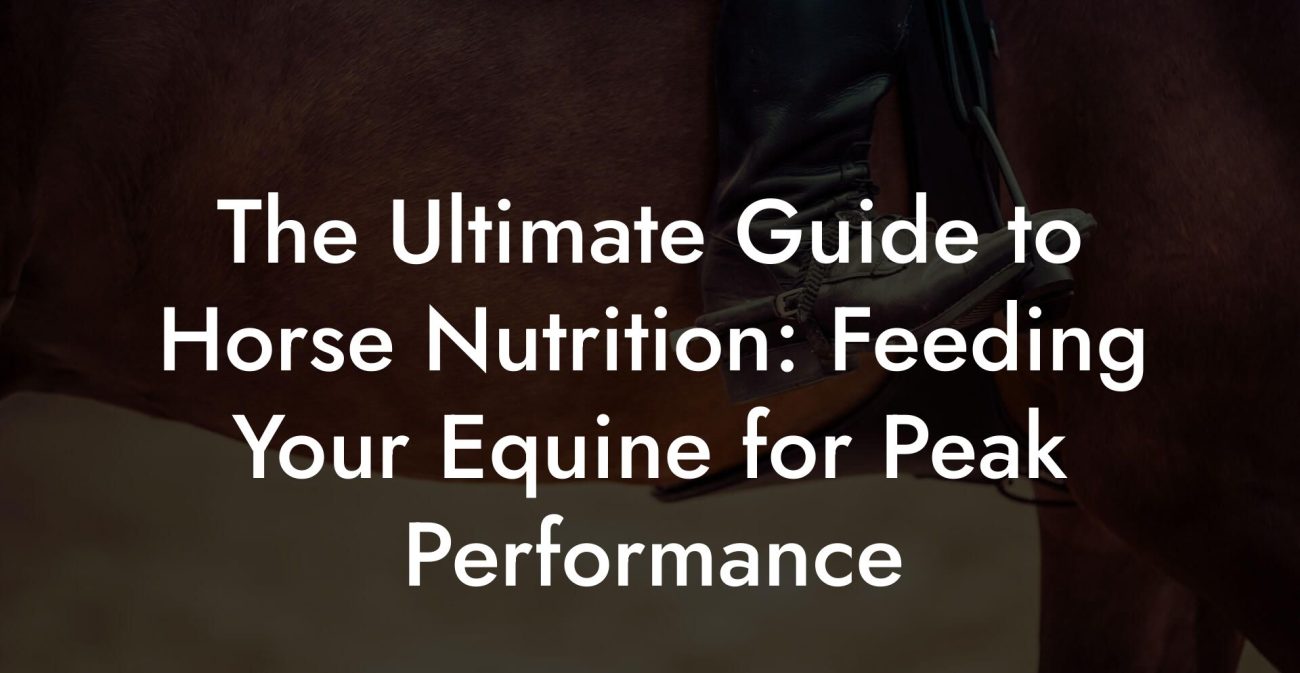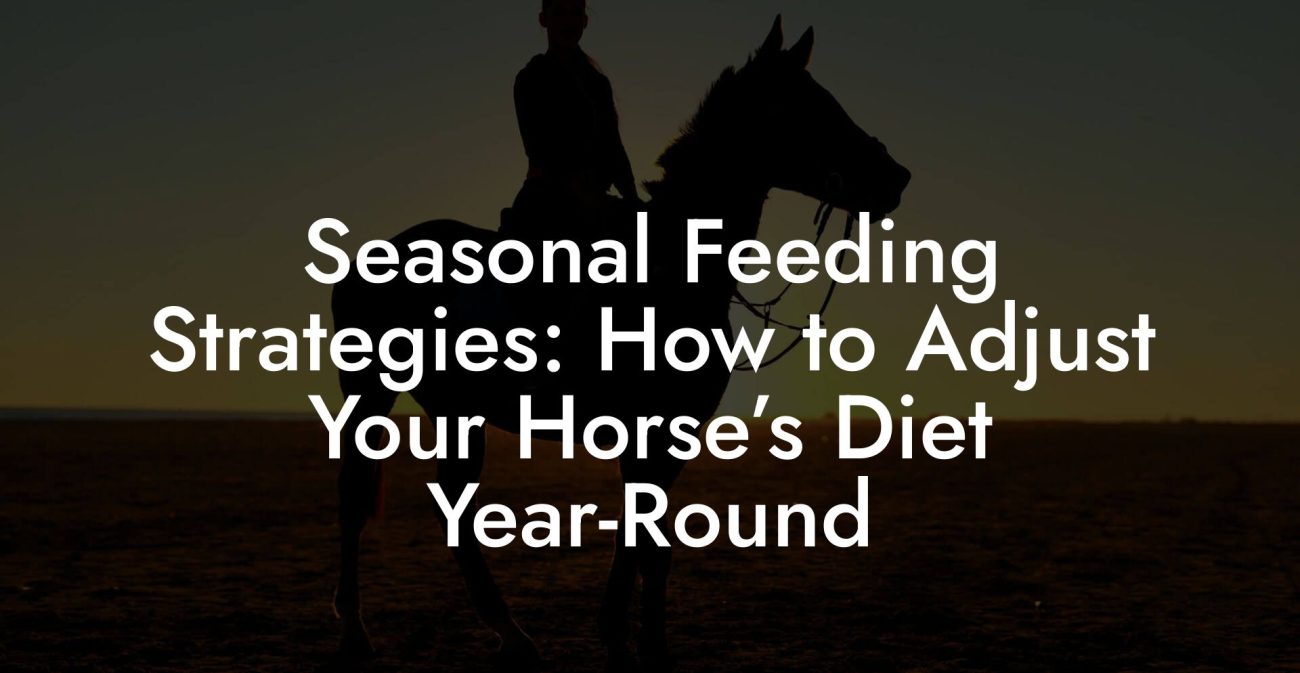Ever wondered how to transform your horse’s bowl into a gourmet feast that rivals the latest foodie trends? In the realm of equine care, decoding a balanced diet isn’t just about tossing hay in a bucket, it’s about orchestrating a symphony of essential nutrients, flavors, and textures that keep your majestic companion trotting with vitality. Whether you’re a millennial equestrian or a Gen-Z horse-lover scrolling through Insta-worthy barn pics, this guide is your backstage pass to understanding the art and science behind feeding your horse right.
Quick Links to Useful Sections
- Understanding Your Horse’s Nutritional Needs
- The Equine Digestive System: A Closer Look
- Macro and Micronutrients: The Building Blocks for Equine Health
- Macronutrients: The Horsepower Fuel
- Micronutrients: The Tiny Titans
- The Importance of Forage: Nature's Superfood for Horses
- Essential Grains and Concentrates: Adding a Dash of Variety
- Supplements and Special Additives: Tailoring Your Horse’s Diet
- Special Dietary Considerations: Life Stages and Performance Needs
- Crafting a Balanced Diet: Practical Steps for Horse Owners
- Step 1: Evaluate Your Horse’s Current Diet
- Step 2: Consult with Experts
- Step 3: Gradually Introduce Dietary Changes
- Step 4: Monitor and Adjust
- Common Feeding Mistakes and How to Dodge Them
- Incorporating Trends: Modern Equine Nutrition and Technology
- Case Studies: Real-Life Transformations Through Balanced Feeding
- Case Study 1: The Revival of a Once-Tired Champion
- Case Study 2: Nurturing Growth in a Foal
- Case Study 3: Senior Serenity and Improved Quality of Life
- Resources and Community Support: Your Next Steps
- FAQs: Your Equine Nutrition Questions Answered
- Your Path to a Thriving Equine Diet
Understanding Your Horse’s Nutritional Needs
Horses aren’t just four-legged herbivores; they’re athletes, grazers, and social creatures with unique nutritional demands. From the powerful muscles that thunder across paddocks to the delicate balance in their digestive system, every aspect of a horse’s physiology requires precision feeding. In other words, crafting the perfect equine diet is like mixing your favorite playlist on repeat, each nutrient plays a crucial part.
At the core, a balanced diet for horses includes two primary components: forage and concentrates. Forage (mostly grass or hay) provides essential fiber that keeps the digestive system humming, while concentrates such as grains and supplements fill in the nutrient gaps. Keywords like “horse nutrition,” “balanced horse diet,” and “equine feed quality” are central here, resonating with anyone looking to optimize the well-being of these gentle giants.
If you’re new to the world of equine nutrition, consider that a horse’s digestive tract is uniquely designed to handle continuous grazing. In fact, their small stomachs and long intestines mean that any sudden change in diet can lead to digestive disturbances. Thus, introducing new feeds gradually and monitoring your horse’s weight, energy levels, and coat shine is as important as liking the right filter on your social media posts.
The Equine Digestive System: A Closer Look
To truly appreciate the importance of a balanced diet, we need to dive into the marvel that is the equine digestive system. Unlike humans, horses are non-ruminant herbivores, which means they don’t have a rumen to ferment food like cows do. Instead, their digestive process is a careful dance starting in the small stomach and continuing into the complex hindgut.
The hindgut is a microbial wonderland where millions of bacteria break down fibrous plant material into digestible nutrients. Keywords such as “equine digestion,” “hindgut health,” and “fiber in horse diet” are essential to understand here. Just like you carefully curate your playlists, maintaining a diverse and healthy microbial community in your horse’s gut is critical, disruptions can lead to colic or laminitis, two conditions that no horse enthusiast wants to entertain.
What does this mean for your horse’s diet? Simply put, forage must be high quality and available throughout the day to prevent the gut microbes from going on strike. Integrating the right balance of forages with the appropriate amount of grains and supplements is the key to a stable digestive environment. Think of it as balancing your coffee intake with water: too much or too little can throw off your whole groove.
Macro and Micronutrients: The Building Blocks for Equine Health
Every meal your horse enjoys is a blend of macronutrients and micronutrients, each with a critical role in maintaining overall health and performance. Let’s break down these components:
Macronutrients: The Horsepower Fuel
Macronutrients include carbohydrates, proteins, and fats. For horses, carbohydrates are primarily derived from fiber in forages, which offers a slow and steady release of energy. Proteins provide the amino acids necessary for muscle repair, growth, and immune function, while fats concentrate extra calories and essential fatty acids that help maintain skin and coat health.
When formulating your horse’s diet, consider keywords such as “energy balance in horses,” “proteins for muscle development,” and “essential fatty acids in equine care.” Striking the right balance not only fuels high performance but also reduces the risk of metabolic issues.
Micronutrients: The Tiny Titans
Micronutrients, including vitamins and minerals, may not pack as many calories, but they are absolutely essential. Vitamins like A, D, and E support vision, bone health, and muscle function, while minerals such as calcium, phosphorus, magnesium, and trace elements support critical bodily functions.
For example, the calcium-to-phosphorus ratio is crucial for bone development, a ratio that many equine enthusiasts obsess over like the perfect snap on Instagram. Keywords such as “vitamins for horses” and “mineral balance in equine nutrition” help reinforce the importance of these hidden heroes in your horse’s diet.
A deficiency or an imbalance can lead to a host of issues, from weakened bones to poor hoof quality. So, whenever you’re selecting supplements or formulating your horse’s meals, keep these micronutrients in mind. Think of them as the premium filters that enhance every post, ensuring every detail is just right.
The Importance of Forage: Nature's Superfood for Horses
Forage isn’t just horse food; it’s the foundation of every equine diet. High-quality grass or hay supplies the necessary fiber and energy while promoting a healthy digestive tract. In fact, equines are designed to graze on forage throughout the day, supporting continuous digestion and ensuring optimal nutrient absorption.
Keywords like “forage quality,” “hay selection for horses,” and “grazing benefits” are essential when discussing the backbone of traditional equine feeding. Not all hay is created equal, different types such as timothy, alfalfa, and orchard grass offer various nutrient profiles, and selecting the right mix can be vital.
When assessing forage quality, pay attention to factors such as color, smell, and moisture content. A vibrant green hue and fresh aroma usually indicate a hay that is rich in vitamins and minerals. Conversely, dusty or brittle hay can be a sign of nutrient degradation or poor storage conditions.
For many modern horse owners, supplementing their equine friend’s natural grazing with hay is akin to keeping up with the latest sustainable lifestyle trends, it’s all about quality, consistency, and balance.
Essential Grains and Concentrates: Adding a Dash of Variety
While forage provides the bulk of a horse’s diet, grains and concentrates serve as a supplemental energy boost, especially for performance horses, growing foals, or seniors with increased nutritional needs. These feeds are rich in carbohydrates and proteins, providing a concentrated source of calories.
However, moderation is the key word here, overfeeding concentrates can lead to digestive disturbances and metabolic disorders. Keywords like “grain feeding,” “equine concentrates,” and “balanced supplement intake” are hot topics among connoisseurs of horse nutrition.
Selecting the right concentrate involves considering your horse’s workload, age, and overall health. Performance horses might benefit from a blend that includes oats and barley, which offers quick, sustained energy, whereas a low-work horse may thrive on high-quality forage alone with minimal supplements.
Additionally, many horse owners pack their feed buckets with specially formulated pellets and mixes that include vitamins and minerals, thus ensuring that every bite packs a nutritional punch. It’s much like curating a limited edition sneaker collection, each element is chosen to enhance overall performance.
Supplements and Special Additives: Tailoring Your Horse’s Diet
Even the most meticulously balanced diet might sometimes need a little extra flair. Supplements can address specific deficiencies and support particular health needs, from joint flexibility to enhanced coat shine. Popular choices include:
- Electrolytes: Perfect for active horses, these help maintain hydration and proper muscle function during intense workouts or long rides.
- Probiotics and Prebiotics: They aid in maintaining a healthy balance in the gut flora, ensuring smooth digestive processes.
- Joint Supplements: Ingredients like glucosamine, chondroitin, and MSM help protect cartilage and support joint health.
- Vitamin and Mineral Blends: These are especially useful during periods of high demand, such as growth spurts or recovery from injury.
When integrating supplements into your horse’s diet, it’s essential to consult with a veterinarian or equine nutritionist to ensure they complement the existing balance and meet your horse’s specific needs. Keywords such as “equine supplements,” “joint health in horses,” and “electrolyte balance for equines” are vital if you’re looking to boost your feed’s impact.
Remember, supplements are exactly that, a supplement to a well-designed diet, not a substitute. They should enhance, not overwhelm, your horse’s nutritional framework.
Special Dietary Considerations: Life Stages and Performance Needs
Just as your Spotify playlist evolves over time, the dietary needs of horses change throughout their lives. A thriving foal requires a nutrient-dense diet rich in proteins and minerals to fuel rapid growth, while a senior horse might need a diet tailored to support joint health and digestive efficiency.
For performance horses, the stakes are even higher. These equine athletes need a precise diet that maximizes energy output, supports muscle recovery, and maintains hydration. Keywords like “foal nutrition,” “senior horse diet,” and “performance horse feeding” are common in the parlance of modern equine care.
Some key considerations include:
- Foals: Emphasize high-quality milk replacers (if needed) and a gradual introduction to solid feed. Forages should be introduced slowly to build digestive health.
- Mature Horses: Focus on a balanced ratio of forage to concentrates with attention to weight management and overall energy levels.
- Senior Horses: Prioritize easily digestible forages and supplements that support joint and hoof health, as well as enhanced fiber digestion.
- Performance Horses: Provide concentrated energy sources, electrolytes, and antioxidants to maintain strength and endurance during long rides or competitions.
Tailoring your horse’s diet to its life stage isn’t just a preference, it’s a critical element of proactive equine care. It’s all about matching the feed to the feat your horse is about to tackle.
Crafting a Balanced Diet: Practical Steps for Horse Owners
Now that we’ve broken down the essential nutrients and feeding strategies, how do you practically apply them to craft a balanced diet? Here’s your actionable game plan:
Step 1: Evaluate Your Horse’s Current Diet
Begin by taking a detailed look at your horse’s current feeding regimen. Keep track of forage types, concentrate amounts, and supplement usage. Noticing trends in energy levels, weight fluctuations, or even changes in coat quality can give you clues about whether improvements are needed.
Step 2: Consult with Experts
Just like you’d check in with a nutritionist for your latest dietary challenge, seek advice from an equine nutritionist or veterinarian. They can provide insights tailored to your horse’s breed, age, workload, and overall health. Remember, keywords like “veterinary nutrition,” “equine dietary consultation,” and “personalized horse feeding plan” underscore the value of expert input.
Step 3: Gradually Introduce Dietary Changes
Horses are creatures of habit, so any dietary change should be introduced slowly over a few weeks. This approach not only helps to prevent digestive upsets but also allows your horse to adjust to new flavors and textures gradually. Whether it’s a switch in hay type or the introduction of a new supplement, be patient and monitor closely.
Step 4: Monitor and Adjust
Use a daily journal or digital tracking app to note your horse’s eating habits, energy levels, and any physical changes. Regular weigh-ins and veterinary check-ups can help identify if adjustments to the diet are needed. Constant monitoring is key to ensuring that your horse’s nutritional needs are continually met.
With these steps, you’re not just feeding your horse, you’re curating a personalized nutritional experience that supports long-term health and performance.
Common Feeding Mistakes and How to Dodge Them
Even the most dedicated horse parents can slip into feeding faux pas from time to time. Let’s break down some common pitfalls and how to avoid them:
- Over-Reliance on Concentrates: While grains and pelleted supplements can boost energy, overfeeding them can disrupt the delicate balance of the digestive tract. Balance is everything!
- Ignoring Forage Quality: Discounting the importance of high-quality hay or pasture is a recipe for digestive issues. Prioritize fresh, nutrient-rich forage above all else.
- Sudden Diet Changes: Horses are creatures of habit, and abrupt changes can lead to colic. Transition slowly and always gauge your horse’s reaction.
- Over-Supplementation: More isn’t always better. Excess vitamins or minerals can cause imbalances. Tailor supplements to your horse’s specific needs.
- Not Adjusting for Life Stages: A one-size-fits-all approach doesn’t work, what works for a foal might be disastrous for a senior horse. Customize the diet based on age and workload.
By steering clear of these common mistakes, you’ll be well on your way to providing a truly balanced diet that keeps your horse thriving.
Incorporating Trends: Modern Equine Nutrition and Technology
Equine nutrition is evolving, and modern trends are making it more exciting than ever to care for your horse. With a surge of innovative feed technologies, smart apps for diet tracking, and high-tech analyses of feed quality, today's horse owners have access to tools that were unimaginable just a decade ago.
Digital tools now allow you to log every morsel of feed provided, monitor weight changes, and even sync data with your veterinarian’s records. With keywords like “smart equine nutrition,” “feed tracking apps for horses,” and “modern horse care technology,” it’s clear that the future is here, blending tradition with innovation.
Whether you’re a tech-savvy millennial or a Gen-Z enthusiast, integrating these modern approaches into your daily routine not only optimizes your horse’s diet but also makes feeding time a fun, interactive experience. Think of it as upgrading your horse’s Instagram feed, every detail matters!
Case Studies: Real-Life Transformations Through Balanced Feeding
To truly appreciate the impact of a balanced diet, let’s dive into some real-life stories from the paddock:
Case Study 1: The Revival of a Once-Tired Champion
Bella, a once lethargic performance horse, had been struggling with low energy and a dull coat. Her owner, inspired by modern equine nutrition trends, overhauled her diet to include a rich mix of high-quality forage, balanced grains, and targeted supplements for coat health. Within months, Bella’s transformation was remarkable, she not only regained her athletic prowess but also sported a shine that turned heads at every competition.
This story underscores the adage that a well-fed horse is a happy horse, and in Bella’s case, a champion once again.
Case Study 2: Nurturing Growth in a Foal
Tiny Thunder, an energetic foal with boundless curiosity, was initially fed a generic diet that left him with developmental challenges. His caretaker switched to a customized nutritional plan, emphasizing protein and essential vitamins for growth, along with incremental introduction to high-fiber forages. Over time, Thunder grew into a robust, playful horse, his energy levels and social interactions reflecting an optimal diet tailored to his developmental stage.
This transformation is a testament to the importance of matching nutritional content with life stage, ensuring that even the tiniest equine minds are set up for success.
Case Study 3: Senior Serenity and Improved Quality of Life
Old Timer, a venerable senior with a life full of adventures, faced age-related challenges such as decreased digestion and joint stiffness. His diet was reimagined to feature softer, easily digestible forages, antioxidant-rich supplements, and a careful reduction in starch-heavy concentrates. The change brought renewed vigor to Old Timer, his movements became more confident, and even his social interactions improved, as he seemed to relish every moment of his golden years.
These case studies illustrate that whether it’s a high-performance athlete, a growing foal, or a wise senior, a balanced diet is the secret sauce behind every thriving horse.
Resources and Community Support: Your Next Steps
Ready to dive deeper into the world of equine nutrition? Connecting with a supportive community and accessing the right resources can elevate your feeding game. Consider joining local equine clubs, online forums, and social media groups where experienced horse owners share tips, success stories, and emerging trends in horse nutrition.
A wealth of knowledge is at your fingertips, from holistic equine nutrition blogs and webinars hosted by veterinarians to interactive apps that track your horse’s diet. Explore reputable resources like the American Association of Equine Practitioners, university research publications, and professional equine nutrition associations. These platforms not only provide evidence-based information but also foster a community of passionate individuals eager to support each other.
Whether you’re looking to make small tweaks or a total overhaul of your horse’s diet, know that you’re not alone. The modern world of equine care is collaborative, innovative, and full of resources designed to ensure that every horse receives the balanced diet it deserves.
Embrace this journey of discovery, learn, experiment, and most importantly, share your successes. Every conversation and new insight not only enriches your own practice but adds to a vibrant, ever-growing community dedicated to the health and happiness of our equine friends.
FAQs: Your Equine Nutrition Questions Answered
Here are some of the most frequently asked questions about creating a balanced diet for your horse, along with clear and concise answers to guide you on your nutritional journey.
1. Why is forage considered the foundation of a horse's diet?
Forage provides the essential fiber that supports continuous digestion and a healthy gut microflora. High-quality grass or hay supplies the nutrients your horse needs while accommodating their natural grazing behavior.
2. How do I determine the right balance between forage and concentrates?
The ideal ratio depends on your horse’s age, workload, and health status. Performance horses may require more concentrates for energy, while low-activity horses thrive on high-quality forage with minimal supplements. Consulting an equine nutritionist can help tailor the perfect balance.
3. What are the most critical macronutrients my horse needs?
Carbohydrates (primarily from fiber), proteins (for muscle repair), and fats (for concentrated energy and essential fatty acids) are crucial macronutrients. Each plays a vital role in sustaining your horse's performance and overall health.
4. Are supplements necessary if I am feeding a balanced diet?
Supplements are designed to fill gaps in the diet. While a well-balanced mix of forage and concentrates may cover most needs, some horses benefit from additional support such as joint or electrolyte supplements, especially under extreme conditions or performance demands.
5. Can a sudden change in diet harm my horse?
Yes, abrupt changes can disrupt your horse’s digestive system, potentially leading to colic or laminitis. Any transition should be gradual over a few weeks to allow proper adaptation.
6. How important is hydration in maintaining digestive health?
Hydration is pivotal for proper digestion, nutrient absorption, and overall health. Ensure your horse has constant access to clean water, particularly when feeding dry concentrates and during hot weather.
7. Do horses require different diets based on their life stage?
Absolutely, young foals, active performance horses, and seniors all have distinct nutritional needs. Diet adjustments are crucial to support growth, performance, or gentle aging.
8. How can technology help me monitor my horse's diet?
Modern apps and digital tracking tools allow you to log feed intake, monitor weight, and even analyze nutrient content. These tools provide insights that can help you fine-tune your horse’s diet over time.
9. Should I consult a professional before making major dietary changes?
Yes, a veterinarian or equine nutritionist can assess your horse’s current health and recommend tailored changes to ensure a smooth transition and optimal nutritional balance.
Your Path to a Thriving Equine Diet
As you embark on the journey of crafting a balanced, nutrient-packed diet for your horse, remember that every bite counts. Embrace the latest in equine nutrition research while also tapping into time-proven feeding practices. With a little creativity and a lot of care, you can create a feeding regimen that not only supports the physical and energetic needs of your horse but also lays the foundation for a long, happy, and healthy life.
From selecting the finest forage to integrating smart supplements and harnessing modern tracking tools, the art of equine nutrition is both a science and a passion. Think of it as curating the ultimate playlist for your horse, each ingredient is a track that, when played in harmony, creates a masterpiece of health and performance.
Your dedication, informed by both tradition and innovation, ensures that your horse will not only meet but exceed the demands of both daily life and competitive pursuits. With every thoughtful adjustment and finely tuned meal plan, your horse’s vitality will shine through, much like the glow of a perfectly filtered Instagram post.
So go ahead, experiment, learn, and share the results with fellow horse enthusiasts. The balanced diet you create today will pave the way for a future where your horse gallops with confidence, vigor, and the unbeatable pride of being well-cared-for.

